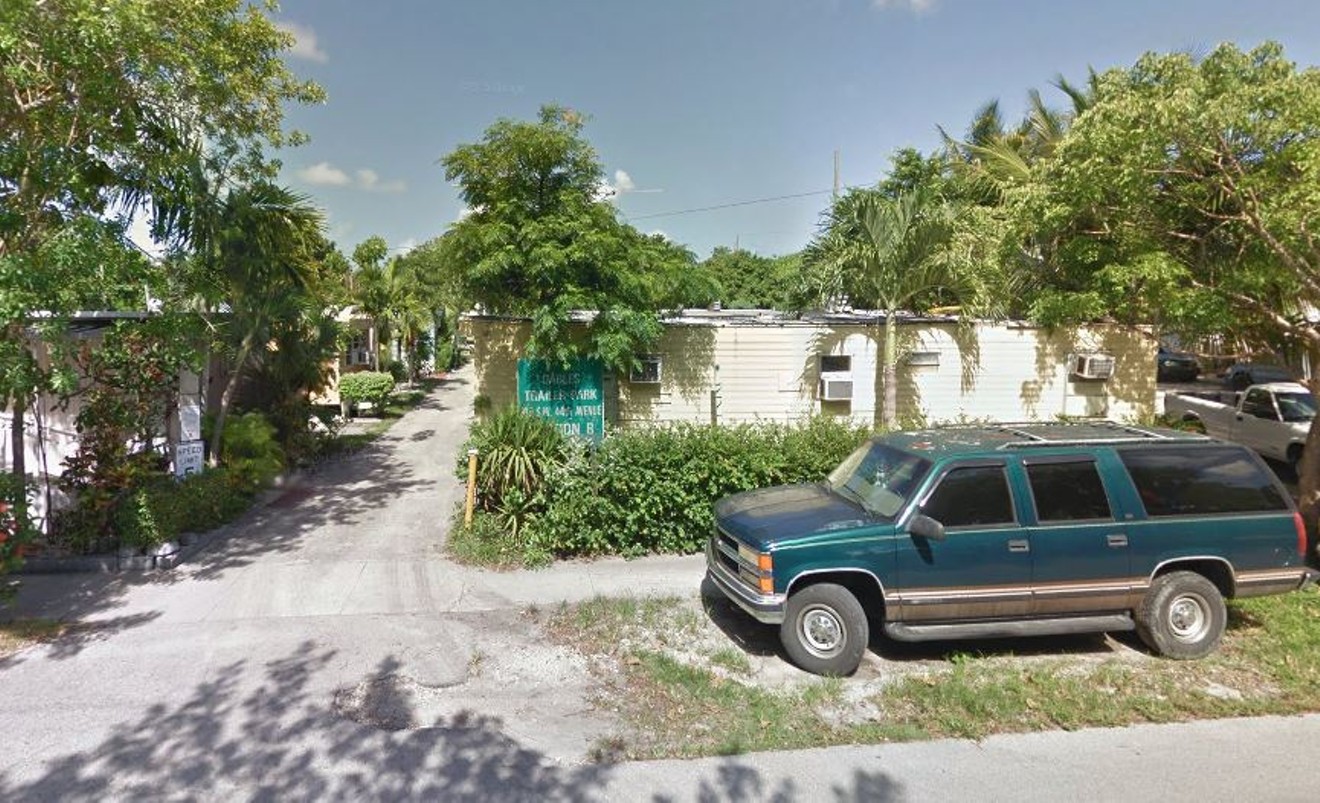For the past two years, Gerardo Cabrera and his wife, Mayte Herrara, have lived in a trailer in a park near the northern edge of Coral Gables. It's not much: The couple splits the space with the owner of the trailer, and each side has only a small room with a bed, a closet, and a minikitchen.
But the rent is only $500 a month — virtually unheard of in a county where most people pay double that amount, costs continue to skyrocket, and the poor are being squeezed harder than residents in any other U.S. city. For Cabrera, a 79-year-old who once painted buildings for a living, and Herrara, a 55-year-old former preschool teacher, it's all they can afford.
"I'll stay here until they tell me I gotta leave," Cabrera says in Spanish outside the trailer while his wife translates. "Until they throw us out."
To the couple's dismay, that could come sooner rather than later. Coral Gables is close to annexing all of Little Gables, the 205-acre, unincorporated Miami-Dade neighborhood where the Gables Trailer Park has stood for decades. And with the City Beautiful's vast pride in its manicured streets and Mediterranean-inspired architecture — plus city codes so strict that pickup trucks were banned from parking in front of homes overnight until 2012 — trailer parks are decidedly unwelcome.
In fact, city officials have already begun planning redevelopment of the site. During a discussion Tuesday about "aesthetic treatment" in Little Gables, City Manager Cathy Swanson-Rivenbark assured commissioners the project would entail "clearly, removing the trailer park and replacing with it some really quality redevelopment that works for the neighborhood, that works for the developer, and also works for the city of Coral Gables."
Where does that leave the dozens of low-income residents who live there?
About 90 trailers stand on the property, which is located across from Graceland Memorial Park North on SW 44th Avenue. They are home to mostly senior citizens who, as Herrara says, "don't have enough money." Under state law, they'll have to be relocated to an adequate place, City Attorney Miriam Soler Ramos told the commission. But there's a caveat.
"It's doable because it also does not necessarily have to be — if people are willing to move elsewhere, Orlando or wherever — it's possible as long as they agree," she said.
When Vice Mayor Patricia Keon asked what would happen if someone were not willing to move, Swanson-Rivenbark said the hope is that some elderly residents would be able to either stay where they are or move into the new redevelopment. The consultants the city hired to help with the project — Dover, Kohl & Partners — are incorporating that idea into planning.
"There are more tools available," Swanson-Rivenbark added ominously. "Some of those tools we probably would not want to discuss publicly."
City officials said they could not immediately respond to New Times' request for clarification on what kind of "tools" she meant. They also did not answer questions about how likely it is that the residents will be allowed to stay or how much of a priority those elderly residents are to the City of Coral Gables.
During the meeting Tuesday, Swanson-Rivenbark said the owner of the trailer park is enthusiastic about the redevelopment — so much so that he keeps asking, "When are we going to get this done?" County records show the property sold for $3 million in 2015 to the Miami company Titan Development Partners, LLC.
After two meetings and a survey that shows 68 percent of Little Gables residents favor the move, Coral Gables commissioners voted last month to submit an annexation application to the county. They first had to win the support of 20 percent of registered voters in Little Gables; they hit 24 percent in September.
City officials are also considering annexing the neighborhoods of High Pines and Ponce Davis, each of which would gain city police and fire-rescue services. If all three annexations go through, Coral Gables would earn an additional $4.7 million in revenue each year, though the city would invest more into Little Gables than it would gain. Little Gables stands out in one major way: It has a median household income of about $61,000, compared to more than $150,000 in High Pines, Ponce Davis, and Coral Gables.
Because Little Gables is tucked into Coral Gables, city officials and consultants say it was always meant to be incorporated. But not everyone is onboard: Some Gables residents have written to city leaders to voice their opposition.
"They feel that it just doesn't look like the Gables, doesn't have the aesthetic of the Gables, doesn't feel like the Gables," Vice Mayor Keon said during Tuesday's meeting. (She said that despite those comments, the vast majority of the neighborhood is "very nice" and will become even nicer once it's brought up to code.)
Also unsure about the annexation are Gables Trailer Park residents. They've been worrying about what will happen and hoping that if Little Gables becomes part of Coral Gables, they won't be forced out.
"I call this my home," Herrara says. "I wouldn't want to leave Miami."
[
{
"name": "Air - MediumRectangle - Inline Content - Mobile Display Size",
"component": "19274298",
"insertPoint": "2",
"requiredCountToDisplay": "2"
},{
"name": "Editor Picks",
"component": "17482312",
"insertPoint": "4",
"requiredCountToDisplay": "1"
},{
"name": "Inline Links",
"component": "18711090",
"insertPoint": "8th",
"startingPoint": 8,
"requiredCountToDisplay": "7",
"maxInsertions": 25
},{
"name": "Air - MediumRectangle - Combo - Inline Content",
"component": "17482310",
"insertPoint": "8th",
"startingPoint": 8,
"requiredCountToDisplay": "7",
"maxInsertions": 25
},{
"name": "Inline Links",
"component": "18711090",
"insertPoint": "8th",
"startingPoint": 12,
"requiredCountToDisplay": "11",
"maxInsertions": 25
},{
"name": "Air - Leaderboard Tower - Combo - Inline Content",
"component": "17482313",
"insertPoint": "8th",
"startingPoint": 12,
"requiredCountToDisplay": "11",
"maxInsertions": 25
}
]












